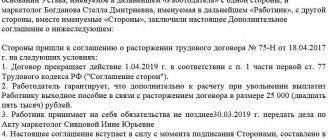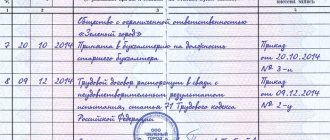The main part of the Armed Forces of the Russian Federation (RF Armed Forces) currently consists of professional military personnel who enter military service through voluntary concluding a contract. Such a contract is signed when filling positions at any level - privates, junior officers, officers - depending on the specialist’s level of education. In essence, such a contract is an analogue of an employment contract in civilian life, but more serious requirements are established for a military personnel. Violation of the terms of the contract on his part also leads to more serious consequences.
What is the dismissal of a military personnel according to the National Criminal Code?
The abbreviation NUK is usually deciphered as “failure to fulfill the terms of the contract.” This abbreviation is used in matters of military service and is based on the wording of the grounds for dismissal of a serviceman by decision of the command. In Federal Law No. 53-FZ of March 28, 1998 “On Military Duty and Military Service,” an exhaustive list of grounds for dismissal of military personnel is set out in Article 51. Paragraph 2 of this article establishes cases when a contract soldier can be dismissed from military service early. In particular, subparagraph “c” allows this “in connection with his failure to fulfill the terms of the contract.”
Dismissal under the National Criminal Code is one of the most serious measures of influence on a military personnel. This follows from the provisions of the Disciplinary Charter of the Armed Forces of the Russian Federation, where Article 54 establishes a list of types of disciplinary sanctions applied to all categories of military personnel. In this list, early dismissal from military service due to failure to fulfill the terms of the contract and equal penalties (not related to contract soldiers, such as expulsion from a military educational organization or military training) in terms of the conditional “degree of severity” are second only to disciplinary arrest.
Based on the provisions of the Disciplinary Charter, it is assumed that less stringent measures of influence before being presented for dismissal (including a reprimand, a severe reprimand, a warning about incomplete official compliance, demotion in position and military rank) must be exhausted or be insufficient. In relation to the dismissal of a serviceman for failure to comply with the terms of the contract, the basis may be circumstances that qualify the disciplinary offense committed as gross. Among them, according to Article 28.5 of the Federal Law of May 27, 1998 No. 76-FZ “On the status of military personnel”, the following:
- unauthorized leaving the place of duty;
- violation of statutory relationships between military personnel;
- failure to appear for duty on time without good reason;
- violation of the rules of service;
- evasion of official duties;
- illegal use or damage to military property carried out intentionally;
- damage to property or its destruction due to negligence;
- refusal to travel;
- violation by the commander of safety requirements, resulting in the death or disability of military personnel;
- violation of confidential records management requirements;
- violation of the procedure for traveling outside the Russian Federation.
Dismissal under the National Criminal Code is also carried out for an administrative violation or crime committed by him. Since their list is not established in the legislation, each of them is considered individually. The main criterion in this case is that the consequences or nature of the offense are incompatible with continued status as a Russian military serviceman.
It will be important to clarify that the text of contracts concluded with military personnel of the Ministry of Defense of the Russian Federation only states the citizen’s obligation to perform military service during the period established by the contract, to conscientiously perform all general, official and special duties of military personnel without specifying them - as “established by legislative and other regulatory legal acts of the Russian Federation".
This is exactly the wording contained in the Standard Form of a Contract for Military Service, approved as Appendix No. 1 to the Regulations on the Procedure for Military Service, and in the vast majority of contracts concluded in practice. It follows from this that non-compliance with the terms of the contract is the failure of the serviceman to fulfill the following duties:
- general - established by the general military regulations of the RF Armed Forces;
- official - determined by the military position being filled by a military personnel, as well as relevant manuals, instructions, regulations, instructions or orders of commanders (chiefs
- special - assigned to military personnel on combat duty (combat service), in daily and garrison duty, in cases of their involvement in eliminating the consequences of natural disasters, as well as in other emergency circumstances.
Thus, a contract soldier is obliged, first of all, to comply with the requirements of the Charter and laws governing service in the Armed Forces of the Russian Federation, and also to strictly carry out orders, except for those classified as illegal. Violation of such requirements on his part will be a guilty act, punishable in accordance with the norms of current legislation, including by dismissal for failure to comply with the terms of the contract.
Procedure
A serviceman can be dismissed in two ways: dismissal in the form of a disciplinary sanction or dismissal based on the results of certification. Let's look at these procedures in more detail.
In the form of disciplinary action
If a serviceman has repeatedly committed a disciplinary offense, then in order to dismiss him it is necessary to prove the fact of his guilt. The responsibility for conducting such an investigation lies with the immediate commander of the offending serviceman. Guilt must be proven within ten days.
If the commander is convinced of the guilt of the subordinate, then the next step is to create an order for the early dismissal of the serviceman. It must indicate:
- FULL NAME. and military rank;
- the grounds for which the dismissal occurs;
- the date from which the serviceman must be expelled from the ranks of the military unit.
The serviceman must be familiarized with such an order in person and signed. If he refuses to sign such an act, then an act of refusal to sign must be drawn up. It is drawn up in the presence of two witnesses. It must indicate which document the serviceman refused to sign and the date the act was drawn up. Drawing up a notice of dismissal in the form of a disciplinary sanction is not required; it is enough to familiarize it with the order.
Convening an attestation commission to assess the suitability of the military position held
In most cases, dismissal occurs based on the results of certification, which is a specialized legal instrument, following which allows one to assess the readiness of a military person to perform his official duties.
Certification is carried out to comprehensively assess the performance of a military contractor and officer. In addition, this certification checks the serviceman’s suitability for the military position held and the prospects for further service. It is important to emphasize that the certification commission for the purpose of assessing the suitability of a serviceman for the position held is created by an administrative act.
The commission includes the following officials:
- chairman - chief of military staff or deputy commander;
- secretary - one of the officers of the military unit;
- members of the commission - deputy commander of a military unit, heads of military units, legal entities, representatives of recruitment and educational work bodies of a given military unit;
- other people who, according to the decrees of the President of the Russian Federation, will help deal with other issues related to the process of military service and other issues.
The commander of the military unit is responsible for the validity of the facts and conclusions about the contract soldier stated in the document.
He has every right to appeal the results and procedure for the certification procedure by sending his application to the battalion chief, or to the court. It is possible to appeal the results of the commission within one month from the date of their official announcement.
If the serviceman's complaint is justified, then:
- appropriate changes are made to the certification sheet;
- a new document is created.
The commander of a military unit can submit a petition to convene an attestation commission. To compile this document, you must use a special template.
It is worth noting that when drawing up a petition, the battalion chief is obliged to:
- fully study the qualities of the certified serviceman;
- based on the studied qualities of a military man, provide a detailed description of the personality based on the results of his certification;
- provide documentation to the authority of certification documents to obtain a final conclusion, as well as approval.
Before the commander of a military unit makes a final decision on the case under consideration, the certification commission issues a written opinion on all issues raised during the process. After the commander makes a final conclusion on the commission, all documents will be sent to the Ministry of Defense of the Russian Federation. Here the main certification commission is formed, which will put forward a final verdict.
Note! The composition of the board, the work plan and the goals of the main certification commission are determined by representatives of the highest federal body or the executive branch, which provides for the presence of military service in them.
The commander prepares a letter to a higher-ranking official, through which he notifies him of the need to dismiss the military contractor from service. A certification commission is preliminarily convened, which makes a decision on the dismissal of the serviceman. The certification sheet is sent to the military unit within two weeks before the inspection. This is necessary so that the military man can familiarize himself with the claims put forward to him and, if necessary, make amendments to the conclusion.
Assessing a serviceman is required in order to confirm or refute complaints directed towards him. As a result, all the pros and cons will be revealed, which will help the commander determine whether it is really worth stopping cooperation with this contractor, that is, issuing a dismissal order.
The dismissal order is usually drawn up in form T-8. It indicates the date of hiring and the date of dismissal, the grounds for dismissal, which is the decision of the commission, the signature of the commander and the signature of the person being dismissed.
Our experts have prepared other useful materials on the topic of military dismissal, and not only in case of early termination of a contract. From them you can find out:
- What does dismissal upon reaching the age limit mean?
- Why and who needs professional retraining before dismissal?
- How to notify an employee and draw up a report about the end of the contract, and also how to properly submit a report to the person resigning?
- The procedure for registering departure from service under a contract.
- State guarantees for housing.
The procedure for dismissing a military personnel according to the NUC
The procedure for dismissal of military personnel is generally regulated by Federal Law No. 53-FZ “On Military Duty and Military Service,” as well as Article 34 of the Regulations on the Procedure for Military Service, approved by Decree of the President of the Russian Federation of September 16, 1999 No. 1237, and a number of departmental orders. The following have the right to early dismissal from military service due to failure to fulfill the terms of the contract in relation to their subordinates:
- For soldiers, sailors, sergeants and foremen - the commander of a military unit (regiment, ship of 1st rank).
- For ensigns and midshipmen - the commander of the army (flotilla).
- To officers from battalion commanders, their equals and below - deputy ministers of defense, commanders-in-chief of the branches of the Armed Forces of the Russian Federation and their equals, in addition to the rights granted to the commander of the troops of a military district, front, fleet and their equals.
According to Article 99 of the Disciplinary Charter of the Armed Forces of the Russian Federation, early dismissal from military service due to failure to fulfill the terms of the contract is applied to a serviceman performing military service under a contract for failure to fulfill the terms of the contract and is carried out without his consent.
If at the time of early dismissal the serviceman has not completed the established period of conscription military service, he is sent to perform conscription military service with two months of contract military service credited for one month of conscription military service.
In accordance with the norms of Article 81 of the Disciplinary Charter of the RF Armed Forces, the procedure for dismissing a military personnel under the NUK is as follows:
- Once a violation is detected, an investigation is carried out within 10 days.
- The serviceman's immediate commander submits a report to higher authorities for early termination of the contract.
- Based on the results of consideration of the report, a decision on dismissal is made and an order to terminate the contract is issued.
Article 81.1 of the Disciplinary Charter specifies that the total duration of the proceedings should not exceed 30 days from the moment when the commander (superior) became aware of the commission of a disciplinary offense by a serviceman, not counting the period of temporary incapacity for work of the serviceman, his stay on leave, and other cases of his absence from service for good reasons.
The immediate superior must initiate an extraordinary certification, which, according to the Resolution of the Constitutional Court of the Russian Federation No. 6-P dated March 21, 2013, is mandatory when deciding on the issue of early termination of a contract. When assigning certification, the following actions are required:
- formation of an attestation commission;
- notifying the serviceman about the inspection two weeks before it begins;
- establishment by the commission of facts of improper fulfillment of the terms of the contract, with the drawing up of an appropriate protocol;
- sending a proposal for early termination of the contract to a higher command, which makes its decision on this issue.
The certification procedure is carried out in the same way for both officers and other contract military personnel.
○ Breach of contract by the Department of Defense
The military department may also violate the terms and conditions included in the contract. These are depriving violations:
- A serviceman's ability to exercise his constitutional rights.
- A serviceman or his family members have the opportunity to enjoy their rights provided by social guarantees and compensation provided for by the current legislation on military service and the status of a military personnel.
✔ Violation of military rights
The main reasons for dismissal from military service on this basis are:
- Late or incomplete payment of the stipulated monetary allowance.
- Inadequate food and clothing supplies.
- Lack of housing allowance.
✔ No salary payments
The law provides that a contract soldier receives a salary consisting of a monthly salary for his military rank and a monthly salary for his position.
For 2021, the average salary for contract servicemen and sergeants ranges from 25,000 to 45,000 rubles per month. In addition, depending on the characteristics of the service, other monthly and additional payments are made:
If there is a fact of non-payment or incomplete payment of the required monetary allowance, the serviceman has the right to raise the issue of termination of the contract due to the fault of the military department.
✔ Denial of leave
The provision of leave is regulated by the Federal Law “On the Status of Military Personnel”. So:
In addition to the main one, additional vacations may be provided. So:
- Veterans - 15 days.
- For admission to educational institutions and participation in training sessions.
- For academic degrees.
- For personal reasons – 10 days.
- Those who have served the maximum period - 30 days at a time.
All types of leave are granted by order of the unit commander on the basis of a report submitted by the serviceman. He must be endorsed by the unit commander. Without his resolution, leave will not be granted.
Consequences of dismissal under the NUC
This reason for dismissal is discriminatory, that is, it entails negative consequences for the serviceman. At the same time, the contract soldier is deprived of the opportunity to choose another, less problematic reason for his dismissal from the army, even if there is one (expiration of the contract, reaching the age limit for military service, recognition of the Military Military Commission as unfit for service for health reasons).
Due to the fact that dismissal from the army under the National Criminal Code is carried out on the basis of the guilty actions of the serviceman himself, the contract soldier is deprived of the right to receive a number of payments due to him upon dismissal on other grounds. Among them:
- severance pay, the amount of which ranges from two to seven monthly salaries, depending on length of service;
- bonuses for the performance of military duties;
- annually accrued financial assistance.
However, if the specified payments were received by the serviceman before the day of dismissal, then they are not subject to recovery due to early termination of the contract.
Non-compliance with the contract by the command
Not only the serviceman, but also his commander can violate the terms of the agreement, because this is a two-sided document. In the case of an officer or a private, his behavior can only lead to a violation of discipline or failure to comply with an order. But the commander may violate the rights of his subordinate. For example, without reason to deprive him of bonuses or vacation.
In order to prove a breach of contract by the commander and restore your rights, you must first draw up a report describing your claims. The document can indicate all violations of the commander point by point and a request to eliminate them. If this brings results, then he has two ways. The first way is to go to court or the military prosecutor's office. The second way is to terminate the contract.
What will happen to the mortgage?
If a serviceman under a contract, dismissed under the National Criminal Code, is a participant in the savings-mortgage system (NIS), then in accordance with paragraph 2 of Article 15 of the Federal Law of August 20, 2004 No. 117-FZ “On the savings-mortgage system of housing provision for military personnel,” he will is obliged to return the amounts paid by the state under the targeted housing loan agreement. Repayment must be made in monthly installments over a period not exceeding ten years. In addition, amounts of money in the form of interest accrued on the amount of the outstanding balance from the date of dismissal are subject to payment.
If the former serviceman does not repay the specified debt, the Federal State Institution "Rosvoenipoteka" has the right to forcibly sell the housing that is pledged. The proceeds are used to pay existing debt, costs associated with the sale and legal fees. If after all the payments there is money left, it is given to the serviceman. If there are not enough funds from the sale, the dismissed contractor continues to remain a debtor and pays off the remaining debts on his own.
Consequences: what are the consequences of such termination of the contract?
If the contract is terminated due to failure to fulfill its terms, the serviceman is deprived of the right to:
- one-time benefit;
- bonus;
- material assistance.
In addition, he will have to hand over clothing (overcoat, etc.), the service life of which has not yet expired.
If the dismissed person is a participant in a military mortgage, and the dismissal was due to his fault, he must return to the state the funds received in the form of a housing loan.
Interest is transferred monthly until it is fully repaid (Part 2, Article 15 of Law No. 117-FZ of August 20, 2004). The grounds for dismissal are not taken into account only if the length of service is more than 20 years.
On our website you can familiarize yourself not only with the dismissal of a serviceman for non-compliance with the terms of the contract, but also with other reasons. Read about dismissal due to general military training, for family reasons of a serviceman, at his own request, at the end of a contract, due to loss of trust.
How will it affect your pension?
According to current legislation, someone dismissed from military service due to failure to fulfill the terms of the contract does not lose military service, as well as insurance service in general.
If there is 20 years of service or more, including in preferential terms, then a pension for length of service is assigned regardless of the grounds for dismissal, including according to the National Tax Code. There is only one exception: if, before the pension was granted, the serviceman was convicted of committing a crime and was deprived of his military rank by a court verdict.
Other consequences
Dismissal of a serviceman in connection with the NUK subsequently makes it impossible to re-enter a contract with the RF Armed Forces or enter service in law enforcement agencies (police, FSB, FSIN, etc.). It may also be impossible to fill a number of positions in state or municipal authorities. Even private security companies and large corporations currently have a negative attitude towards the employment of former contract workers dismissed under the NCA.
Required payments and compensations
On the last day of entry into service, the serviceman receives the remainder of the salary due to him under the contract. Regardless of the reason for dismissal, the state guarantees financial support to the former employee. It is expressed as follows:
- One-time benefit.
- Material aid.
- Social benefits provided for military personnel under contract.
It is important to know! Incentive payments or compensation for expenses incurred on a business trip are calculated individually.
Dismissal under the NUC: judicial practice
The current judicial practice in matters of dismissal of military personnel is based mainly on Resolution of the Plenum of the Supreme Court of the Russian Federation No. 8 of May 29, 2014. Regarding early dismissal from military service due to failure to comply with the terms of the contract, it states that this basis can be applied to military personnel as a disciplinary sanction and in the certification procedure, taking into account the serviceman’s compliance with the requirements imposed on him.
Failure to fulfill the terms of the contract as a basis for the early dismissal of a serviceman from military service should be considered only significant (significant) deviations from the requirements of the legislation on military duty and military service, which can be expressed, in particular, in the commission of:
- guilty actions (inactions) indicating that the serviceman lacks the necessary qualities to properly perform the duties of military service;
- one of the gross disciplinary offenses, the elements of which are listed in paragraph 2 of Article 28.5 of the Federal Law “On the Status of Military Personnel”;
- disciplinary offense if he has outstanding disciplinary sanctions;
- a criminal offense or an administrative offense for which a military serviceman is liable on a general basis;
- other legally significant circumstances allowing, due to the specifics of the serviceman’s official activities, to conclude that he has ceased to meet the requirements of the legislation on military duty and military service imposed on military personnel performing military service under a contract.
If a serviceman, in terms of his business and personal qualities, does not meet the requirements for persons undergoing military service (which may be evidenced, for example, by the presence of outstanding disciplinary sanctions), his early dismissal from military service is possible only based on the results of certification, including extraordinary.
What is the statute of limitations
A serviceman who considers himself innocent has the right to submit a complaint to the commander (superior) within 10 days from the date of application of the disciplinary sanction. This is established by Article 83 of the Disciplinary Charter of the RF Armed Forces, but in practice it is unlikely to be effective in case of dismissal under the National Criminal Code.
For appealing a command decision in court, the statute of limitations is three months from the date of issuance of the dismissal order. An application for the issuance of copies of orders is submitted in any form, such as “I ask you to issue (send to the address) duly certified extracts from orders No.__ dated__ on my dismissal...”.
Report on dismissal from the military
SIMFEROPOL, March 2 – RIA Novosti. Representatives of the Armed Forces of Ukraine stationed in Crimea are leaving military units and are en masse submitting reports of dismissal, RIA Novosti correspondent reports. The abandoned military units, military equipment and arsenals come under the control of the self-defense forces, which ensure security and order in the region. On Thursday it became known that the buildings of the Supreme Council and the Council of Ministers of Crimea in Simferopol are controlled by self-defense forces of the Russian-speaking population. Later, the speaker of the Supreme Council, Vladimir Konstantinov, said that the self-defense units occupying the building of the Supreme Council of Crimea would leave parliament. First Deputy Prime Minister of Crimea Rustam Temirgaliev said on Saturday that there are no capable units of the Ukrainian Armed Forces left in Crimea.
There are no specific or definite deadlines here. Such deadlines are not defined by laws and orders. The law establishes certain grounds allowing dismissal under these circumstances. If they are agreed upon between departments (MoD and Ministry of Internal Affairs), there are no problems. All that remains is to wait for the order. But if they are not agreed upon, or the commander balks, then alas. . Wait. There will be an order.
We recommend reading: Tax on deed of gift for an apartment
How to appeal
If a serviceman believes that his dismissal is unlawful, he has the opportunity to express his disagreement with the results of the investigation or to protest it. This can be done through the court. It is also necessary to provide documentary evidence that the dismissal was illegal or the procedure was not carried out in strict accordance with the law.
After the court makes a decision in favor of the plaintiff, he is reinstated in military service and has the right to return to his duties. The period during which he did not serve due to illegal dismissal will be included in the total length of service.
Sample report
A sample report on dismissal from the RF Armed Forces for non-compliance with a contract can be found on the Internet. This document must indicate the reason for dismissal, as well as the exact name of the law in accordance with which the process is carried out.
Dear readers! To solve your problem right now, get a free consultation
— contact the on-duty lawyer in the online chat on the right or call:
+7
— Moscow and region.
+7
— St. Petersburg and region.
8
- Other regions of the Russian Federation
You will not need to waste your time and nerves
- an experienced lawyer will take care of solving all your problems!
What is the practice: in whose favor are decisions made?
Judicial practice shows that a serviceman’s challenge to his dismissal under the National Criminal Code is quite often resolved in his favor. In most cases, this happens when there are violations of the dismissal procedure or certification procedure on the part of the command. For example, the participation of a serviceman at a meeting of the certification commission when considering the issue of early dismissal under the National Criminal Code was not ensured. There are also frequent cases of dismissal being declared illegal when the guilt of a serviceman in committing a disciplinary offense, which served as the basis for dismissal under the National Criminal Code, is recognized as unproven.
Much less often, dismissal under the National Criminal Code in favor of a military personnel is accepted if he is convicted of committing a crime to a punishment not related to imprisonment or deprivation of a military rank or the right to hold military positions. But there are examples when, even in such a situation, a higher court overturned the decision on dismissal - in particular, when the serviceman is characterized positively and has no disciplinary sanctions for a long period.
Examples of the opposite (the court upholding the command decision on dismissal) are typical when the criminal case was dismissed by the court on non-rehabilitating grounds (including in connection with active repentance), or with reconciliation of the parties (for example, when a serviceman caused an accident with severe consequences). The same decisions are not uncommon in cases of socially dangerous administrative offenses (such as driving a vehicle while intoxicated).
Disciplinary offense
A disciplinary offense means the commission of an offense by a military personnel, which is contained in the Disciplinary Charter. Dismissal for non-compliance with the contract is carried out if he has committed one or more gross misconduct. The situation is aggravated by the presence of penalties that were not lifted from the violator.
If violations are systematic, this should be recorded. But a commander or superior is prohibited from engaging a serviceman twice for the same violation. In other words, if a person has already been punished for an offense, then it cannot be dismissed.
The reason for termination of the contract may also be the officer’s refusal to carry out the commander’s order. An example of this would be a refusal to go on a business trip. The serviceman explained his decision by saying that the document contained information about his service in a specific place. The conflict was resolved in court and the court admitted that the officer had no right to refuse to perform his duties.










